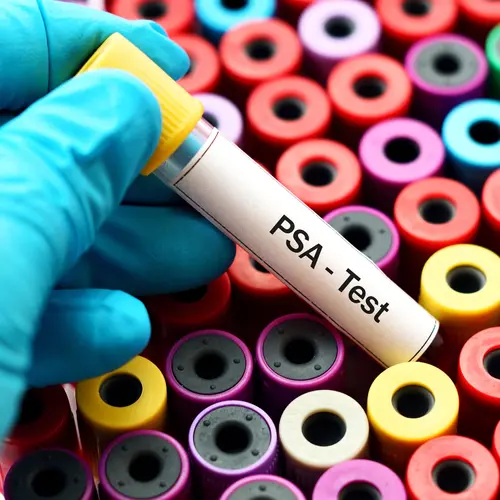Oct. 21, 2025 – A new drug combination cuts the risk of death in people with advanced prostate cancer by 40% over eight years, according to unprecedented results of a drug treatment trial in men whose prostate cancer had returned.
That means a 70-year-old man whose prostate cancer recurs could live about another 15 years, said study author Stephen Freedland, MD, a professor of urology at Cedars-Sinai Medical Center in Los Angeles. "For many of these patients, I think we are turning [prostate cancer] into a chronic disease, which is really exciting."
Prostate cancer is the second leading cause of cancer death among men, behind lung cancer. About 1 in 3 men treated with surgery or radiation for prostate cancer have what doctors call a "biochemical recurrence," meaning their PSA levels double in nine months or less but imaging can't detect a tumor. This was the population involved in the new study.
The combination treatment included enzalutamide (marketed under the brand name Xtandi) and leuprolide, a hormone therapy that lowers testosterone. Among those who took the drug combination, 79% were still alive after eight years, compared to 73% for enzalutamide alone and 70% for leuprolide alone.
No other treatment for recurrence has come close to these results.
The findings build on earlier research showing a clear five-year metastasis-free survival benefit for the drug combo. This makes the combination approach "the clear standard of care," Freedland said.
But it comes with significant side effects – including fatigue, enlarged breasts (gynecomastia), and lower libido – making the decision whether to take one or both medicines a very personal one. Either treatment alone can have side effects, but they can be "quite profound" when the drugs are combined, said Neil Fleshner, MD, MPH, a professor of urology at the University of Toronto who has studied enzalutamide.
"I usually tell men, when they start [drugs like leuprolide], that they're going to be 90% of their normal selves," he said, adding that it will affect their "energy, oomph, muscle mass, and strength. … When you add drugs [like enzalutamide], it becomes more profound. Now you're like 70% or 75% of yourself."
If your prostate cancer has returned after surgery or radiation, here's how the new research can help guide this important conversation with your doctor.
What to Ask Your Doctor
Am I a candidate for combination drug therapy?
The new study confirms that combination drug therapy offers the greatest survival benefit – but this finding applies to a specific subset of patients, Fleshner said.
The doubling time for your PSA test matters. Slowly rising PSA after a prostatectomy – between 0 and 25 over five years – doesn't warrant aggressive combination therapy, Fleshner said. "That would probably be over-treatment for those men."
In many cases, leuprolide alone may be enough, said Fleshner. But if it's found that you're at high risk of recurrence – for example, if you have a short doubling time on PSA testing – that's when to have a conversation with your doctor about the benefits and trade-offs of combination therapy.
How should my age be factored into the decision?
Your age is a key factor in terms of lifespan and side effects. "Generally, if you're a 70-year-old man, sexual activity doesn't get better," Freedland said, and you're likely to start taking a medication to help with that anyway. At the same time, men who are 75 or older are often more impacted by the side effects of fatigue and frailty, Fleshner said, noting that this is what he sees among his patients.
Could I be a candidate for monotherapy with enzalutamide?
For some patients, preserving sexual function "is really important," Freedland said. In those cases, Freedland may discuss the possibility of taking enzalutamide alone – which generally makes for a slower decline in sexual interest, sexual satisfaction, and erectile function.
Keep in mind that enzalutamide tends to cause fatigue, which eventually may impact sex life anyway, Fleshner noted – just not as quickly. A separate study that Freedland co-authored this year suggests that patients on enzalutamide alone may get a few more months before they have less sexual interest, compared with people taking leuprolide alone, or leuprolide with enzalutamide.
Fleshner said that when he does have a patient on enzalutamide, he sometimes reduces the dose to limit side effects.
If You're Already on Monotherapy …
Bring up this new data with your doctor and ask if you should revisit the reasons you're on monotherapy, Freedland said. "It may well be that they're on the correct therapy," but it's worth a conversation, he said. "For the most aggressive tumors, you want the most aggressive therapy."
If a Scan Spots Your Recurrence …
This latest data is from a trial that started a decade ago, before today's more sensitive imaging – like the PSMA PET scan – became available. Today, if a scan detects a metastasis, you may have other treatment options, like radiation, before taking these drugs.
If that's you, ask your doctor whether these drugs would still help. It's possible they would, even if used with radiation or other local therapy, Freedland said. "We couldn't identify any subset of patients that did not benefit."

